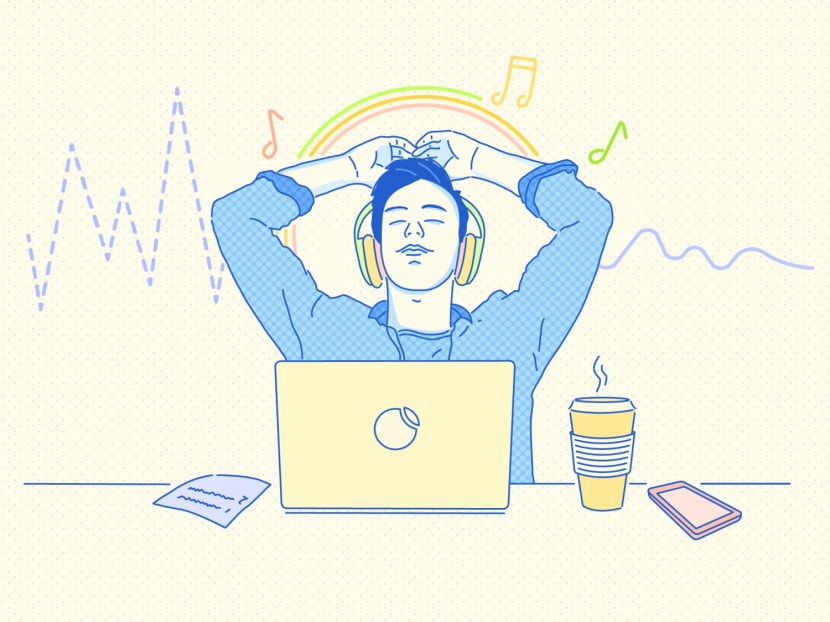Gen Zen: I listen to birdsongs and babbling brooks as a 'ritual'. It's a simple, free way to get into the right headspace for everything in life

(Illustration: CNA/Samuel Woo)
SINGAPORE — There is one particular habit that I often find myself falling back to whenever stress or anxieties begin to creep in and affect me.
I would plug in my earbuds, listen to the sound of a babbling brook or chirping songbirds and close my eyes for a few minutes to clear my mind.
It works for me. Any stress that I had till that point would magically dissipate, and I end up feeling recharged and liberated to continue whatever I was dealing with, such as conducting back-to-back interviews for an assignment.
I never really put much thought into this simple act, which I found was a quick and useful way to enter the right space of mind for work-related situations.
But after speaking to some friends, I realised that my method of coping with stress was a pretty simple and cost-efficient way to put myself at ease.
Earlier this month, my colleague wrote about how she took to splurging on pricey keyboards and leather-bound notebook to tune up her work-from-home space, though her results were mixed.
In comparison, the nature soundscape that I tune in to is a free built-in feature in my earbuds companion application.
More than that, my conversations with mental health experts revealed to me that similar “simple rituals” can help with most scenarios in general, not just for dealing with stress.
When I am about to turn in for the night, for example, I could use my method to dispel any work-related thoughts that happened during the day. These aren't particularly stressful thoughts, but more like a mental itch that I would rather not have.
And when I open up my laptop in the morning of a work day, listening to serene soundtracks helped me ward off any distractions. Just as how a sportsman needs a pre-game routine to help them focus on their performance, pre-work rituals can help me become more effective in my tasks.
Fortunately, these acts to help me get into the right headspace don't require money — or even too much time.
HOW TO 'GET IN THE ZONE'
For a person to be "in the zone" in order to perform at their best, he or she needs to have focus and to be motivated.
But mental health experts told me that this may not always be the case due to a range of reasons. Someone who is unable to compartmentalise their thoughts, for example, may find it hard to be "zoned in".
This was especially prevalent during the Covid-19 pandemic, when work-from-home arrangements blurred the lines between work time and personal time, they said.
For professional counsellor Avanti Nim, getting in the zone also does not necessarily mean that one has to spend money.
The mental health expert from Talk Your Heart Out, a therapy platform, said: “Certain rituals can help us structure our time a little better and set ourselves up for productive success.”
One suggestion that often came up was journalling. As the name suggests, this involves jotting down one’s thoughts and emotions on a regular basis.
Doing it right after work can help a person “download” the thoughts and feelings accumulated throughout the workday that are not relevant to one’s personal life, giving a sense of closure, Ms Avanti said.
“You may also do the same at the beginning of the day, so that you go into work having already wrote down thoughts about your personal life,” she added.
One colleague who is an avid journaller recently even discovered different forms of journalling, including ways to do so even if writing isn't one's strong suit.
Ms Avanti also highlighted certain apps that provide free guided meditations, particularly for those who do not know how to start or would like a little structure in this exercise.
A colleague of mine practises meditation after he wakes up and before he sleeps, with each session lasting about 20 minutes.
He says that it helps him start work with a clearer mind and go to sleep easier, unencumbered by the experiences of the day.
My friends shared how they also did certain things regularly to help them shift from one state of mind to another, especially after work.
These rituals run the gamut from taking a quiet stroll alone to the bus stop, watching re-runs of their favourite sitcoms or playing “cosy games” on one’s tablet — anything that injects a dose of happiness and takes the mind away from the work that just ended.
When it comes to resting, Dr Geraldine Tan, director and principal psychologist at The Therapy Room, told me that it is important to always schedule in some “self time or me time” daily, as well as some time to socialise weekly or periodically, and protect these pockets of time.
“A lot of times when we feel tired or jaded, the first thing we take away is the 'me time' or the social time,” she said.
STICKING TO THE RITUALS
I told the mental health experts that activities like journaling, meditating or even taking a walk sound like a routine that I might have trouble committing to regularly.
Given my already packed schedule, adding yet another item on my daily timetable just did not seem appealing to me.
To this, Ms Avanti reiterated how "habit stacking" can be a useful approach. It is a way of performing multiple rituals at the same time, she explained.
For example, if I want to make a habit of listening to a non-fiction podcast, I can do that while making and drinking coffee.
Closely associating the new habit with an existing one helps the former "become more of an automatic process", thereby making it easier to stick to, she said.
Dr Tan reminded me to also not overlook the seemingly small routines that one would typically do already at the start of the work day, like washing up, preparing a cup of coffee and having breakfast.
All these make up “tiny psychological cues” that I could give myself to help transit into the proper “psychological space” for work, she said, adding that I should not rush these activities or skip them even when I work from home.
In any case, the experts reminded me to set realistic goals when embarking on the journey of starting a new habit, so that it does not overwhelm me.
“Little changes over time are much more sustainable than a complete overhaul of your existing routine,” Ms Avanti said.
For now, it is unlikely for me to make a daily habit out of meditation or taking walks right after work because, as I mentioned earlier, I would need to cater time for them that I may not have.
But I now know the importance of doing something during the transition from work to rest, and not go straight from my work desk to the bed or couch.
Instead, I’ll make myself a nice (caffeine-free) drink and take time to enjoy it, with my earbuds plugged in playing the sound of a babbling brook or chirping songbirds.








